From the LA Times
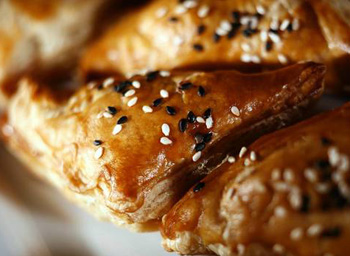 As a child in Hebrew school, I was taught the story of the Hanukkah miracle: When the Jews in the land of Israel defeated the foreigners, the priests seeking to rekindle the temple's eternal light found enough ritually pure oil for only one day. Miraculously that oil lasted for eight days.
As a child in Hebrew school, I was taught the story of the Hanukkah miracle: When the Jews in the land of Israel defeated the foreigners, the priests seeking to rekindle the temple's eternal light found enough ritually pure oil for only one day. Miraculously that oil lasted for eight days.
Since then, Jews have been celebrating Hanukkah every year by lighting candles every day for eight days. Children in Israel play with dreidels inscribed with the first Hebrew letters of the phrase "a big miracle happened here"; in Washington, D.C., my birthplace, our dreidels had the first letters of "a big miracle happened there."
Until I lived in Israel, I associated the holiday with latkes, or potato pancakes. But when I moved there I discovered that for many Israelis, sufganiyot, or jelly doughnuts, are the favorite Hanukkah treat. I also realized that the connection of such foods to Hanukkah is the oil in which they are fried.
What we hadn't learned in Hebrew school was that the oil of the Hanukkah miracle was olive oil. In ancient Israel, olive oil was used for lighting lamps, for religious rituals and for cooking. Based on archaeological evidence, the land of Israel was an olive oil production center.

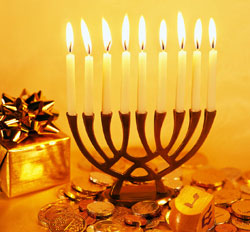 I was recently roped I…I mean asked to participate in Canter’s
Chanters Chanukah Extravaganza at my Temple. When it was first
presented to me, I thought, ‘Great, our Canter is a cool guy and is
probably open to doing some improv or something with the kids. That’s
got to be why he’s asking me. This’ll be fun.”
I was recently roped I…I mean asked to participate in Canter’s
Chanters Chanukah Extravaganza at my Temple. When it was first
presented to me, I thought, ‘Great, our Canter is a cool guy and is
probably open to doing some improv or something with the kids. That’s
got to be why he’s asking me. This’ll be fun.”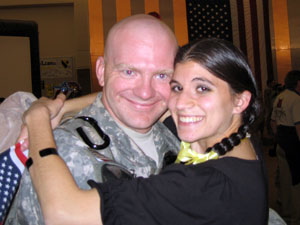 My husband is on active duty in the US Army, and for our first holiday
season together we were living in a little town called Sierra Vista,
Arizona, which is adjacent to Fort Huachuca, where he was stationed.
Since we had only been married since the previous January and we were
just starting our life together, we couldn’t afford to go home to our
beloved California and our families for the holidays, so we were
toughing it out in Sierra Vista alone.
My husband is on active duty in the US Army, and for our first holiday
season together we were living in a little town called Sierra Vista,
Arizona, which is adjacent to Fort Huachuca, where he was stationed.
Since we had only been married since the previous January and we were
just starting our life together, we couldn’t afford to go home to our
beloved California and our families for the holidays, so we were
toughing it out in Sierra Vista alone.
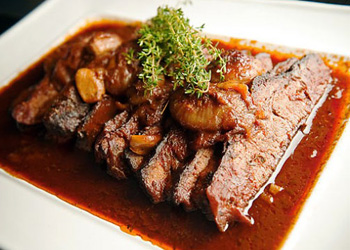 I’ve tried many brisket recipes and this has become a longtime favorite. The method comes from a Cooks Illustrated recipe that requires a few hours of unattended cooking, as well as advance preparation. After cooking, the brisket must stand overnight in the braising liquid that later becomes the sauce; this helps to keep the brisket moist and flavorful.
I’ve tried many brisket recipes and this has become a longtime favorite. The method comes from a Cooks Illustrated recipe that requires a few hours of unattended cooking, as well as advance preparation. After cooking, the brisket must stand overnight in the braising liquid that later becomes the sauce; this helps to keep the brisket moist and flavorful.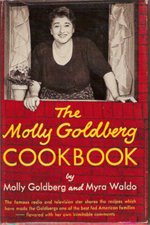 I was recently given a gift of an out of print cookbook called The Molly Goldberg Cookbook. When I first saw it I was amused and when I opened it up, I immediately saw a cabbage recipe I wanted to make. Score! Here was a cookbook that had that “Through The Looking Glass” aspect to it. These were recipes long forgotten, mysterious in their 1950-ness, soon to be resurrected by me!
I was recently given a gift of an out of print cookbook called The Molly Goldberg Cookbook. When I first saw it I was amused and when I opened it up, I immediately saw a cabbage recipe I wanted to make. Score! Here was a cookbook that had that “Through The Looking Glass” aspect to it. These were recipes long forgotten, mysterious in their 1950-ness, soon to be resurrected by me!